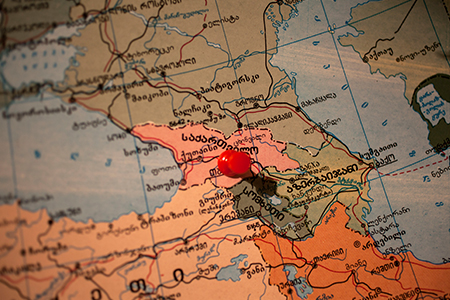UN Security Council discusses situation in Abkhazia and Tskhinvali

Developments in the Russian-occupied regions of Georgia - Abkhazia and Tskhinvali (South Ossetia) were among the issues discussed at the United Nations Security Council’s meeting yesterday.
The reduction of crossing-points connecting Abkhazia with the rest of Georgia, illegal parliamentary elections in Abkhazia, unification of armies under the Russian Armed Forces as well as upcoming referendum on changing Tskhinvali’s name to "the Republic of South Ossetia – the State of Alania” were among the issues the delegates discussed behind the closed doors.
.@UN Security Council just concluded discussion of the situation in #Georgia. Watch Amb @YelchenkoUN's remarks to the media. #UAinUNSCpic.twitter.com/cPsncN1PEn
— UKR Mission to UN (@UKRinUN) March 28, 2017
Ukrainian Ambassador to the UN Volodymyr Yelchenko thinks the situation is really deteriorating in breakaway regions. He said this is not "a frozen or sleeping conflict” but rather "reminds us very well as we know from our own painful experience in Crimea,” which he believes is the attempt of annexation.
The action by the Russian Federation, which in fact aimed at factual unification of armed forces of Russian Federation and Ossetia and Abkhazia, closing down of the crossing-points… ethnic situation in the field of human rights… so all of these in our opinion deserves the attention of the Security Council”, Yelchenko said.
Matthew Rycroft, United Kingdom’s Ambassador and Permanent Representative to UN called elections in Abkhazia and Tskhinvali region a farce, and his country does not recognise them.
Parliament elections in #Abkhazia were a farce. So-called "presidential elections" in #SouthOssetia will be same. Do not recognise either.
— Matthew Rycroft (@MatthewRycroft1) March 28, 2017
He said above mentioned developments in Abkhazia and South Ossetia do not contribute to lasting solutions.
All the delegations of the UN Security Council were in favour of Georgia’s sovereignty and territorial integrity except from the Russian Federation.
.@RussiaUN blocked press elements supporting Georgia's sovereignty.At least Russia is consistent in reiterating its disrespect of UN Charter pic.twitter.com/zYsHTB5IFF
— UKR Mission to UN (@UKRinUN) March 28, 2017
As of today, only four countries recognise Georgia’s breakaway regions as independent republics: Russia, Nicaragua, Venezuela and Nauru.
According to the August 12, 2008 Ceasefire Agreement, issues including non-use of force, creation of international security arrangements in breakaway Abkhazia and Tskhinvali region and the safe and the dignified return of IDPs and refugees are essential subjects of discussion.
The six-point ceasefire agreement that both Georgia and Russia signed after the five-day August 2008 war demands the withdrawal of Russian military forces from Georgian territory to create conditions for the peaceful resolution of the conflict.
 Tweet
Tweet  Share
Share